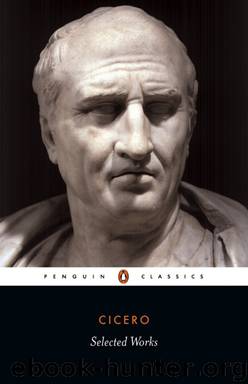Selected Works by Cicero

Author:Cicero
Language: eng
Format: epub
Publisher: Penguin Books Ltd
Published: 2016-07-21T16:00:00+00:00
PART TWO
HOW TO LIVE
CHAPTER FOUR
A PRACTICAL CODE OF BEHAVIOUR
(ON DUTIES · III)
No one will ever write anything more wise, more true, or more useful. From now on, those whose ambition it is to give men instruction, to provide them with precepts, will be charlatans if they want to rise above you, or will all be your imitators.
VOLTAIRE (1771)
This work, which exercised so unparalleled an influence from the early Fathers until the nineteenth century.(pp. 25 ff.), is a manual of right behaviour and civics, ostensibly addressed to the writer’s son Marcus who was studying at Athens (and who had the instincts not of a philosopher but of a hard-drinking soldier). In the first two of its three Books Cicero has drawn heavily upon the eminent Greek Stoic, Panaetius of Cos (c. 185–109 B.C.),1 the writer of a book with a similar title in which he endeavoured to relate the austere Stoic morality to the practical needs of contemporary public and commercial life. The first Book of Cicero’s work discusses Moral Right, the second Advantage, and this third Book deals with a problem with which life confronts us every day: namely, what is to be done when right and advantage seem to clash. He concludes by pointing out that such clashes can only be apparent, never real, and this gives him occasion to reassert the supremacy of moral considerations over all others. In this part of the treatise Cicero shows many signs of drawing away from Panaetius, who had never carried out his declared intention of tackling this branch of the subject. Cicero calls upon other Stoics, including a contemporary – Athenodorus Calvus, who summarized for him, as we know from a letter, a relevant work by the Stoic polymath Posidonius of Apamea in Syria. But on the whole, as Cicero himself states and as his wealth of Roman illustrations and anecdotes (not to speak of the unphilosophical structure of the book) confirms, he is now writing independently and in accordance with his own experience and his own interpretation of what he has read. The result is a remarkable discussion of how a Roman citizen ought to meet the various problems of his life. Cicero, interpreting life as a complex of obligations to others as well as oneself, offers a splendid testimony to the beliefs in human cooperation which he so enthusiastically confirmed from his readings of the Stoics, and yet tempered with his own undogmatic good sense.
Such a study follows naturally enough after the works on cosmology and theology which he had recently completed.1 Yet On Duties also had a topical significance: for, although perhaps not published until after Cicero’s death (this may account for some textual uncertainties), the book was for the most part written between September and November 44 B.C., during that very same astonishingly productive period of Cicero’s life which produced the Philippics and so much else. This accounts for its bitter incidental allusions to the suppression of Roman public life by the autocracies of Caesar and Antony.
Download
This site does not store any files on its server. We only index and link to content provided by other sites. Please contact the content providers to delete copyright contents if any and email us, we'll remove relevant links or contents immediately.
| Ancient & Classical | Arthurian Romance |
| Beat Generation | Feminist |
| Gothic & Romantic | LGBT |
| Medieval | Modern |
| Modernism | Postmodernism |
| Renaissance | Shakespeare |
| Surrealism | Victorian |
4 3 2 1: A Novel by Paul Auster(11034)
The handmaid's tale by Margaret Atwood(6836)
Giovanni's Room by James Baldwin(5871)
Big Magic: Creative Living Beyond Fear by Elizabeth Gilbert(4718)
Asking the Right Questions: A Guide to Critical Thinking by M. Neil Browne & Stuart M. Keeley(4566)
On Writing A Memoir of the Craft by Stephen King(4205)
Ego Is the Enemy by Ryan Holiday(3982)
Ken Follett - World without end by Ken Follett(3968)
The Body: A Guide for Occupants by Bill Bryson(3789)
Bluets by Maggie Nelson(3705)
Adulting by Kelly Williams Brown(3663)
Guilty Pleasures by Laurell K Hamilton(3578)
Eat That Frog! by Brian Tracy(3507)
White Noise - A Novel by Don DeLillo(3430)
The Poetry of Pablo Neruda by Pablo Neruda(3358)
Alive: The Story of the Andes Survivors by Piers Paul Read(3302)
The Bookshop by Penelope Fitzgerald(3221)
The Book of Joy by Dalai Lama(3212)
Fingerprints of the Gods by Graham Hancock(3206)
